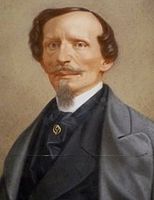
Georg Leo Graf von Caprivi de Caprara de Montecuccoli was a German general and statesman who served as the chancellor of the German Empire from March 1890 to October 1894. Caprivi promoted industrial and commercial development, and concluded numerous bilateral treaties for reduction of tariff barriers. However, this movement toward free trade angered the conservative agrarian interests, especially the Junkers. He promised educational reforms to the Catholic Center party which would increase their influence, but failed to deliver. As part of Kaiser Wilhelm's "new course" in foreign policy, Caprivi abandoned Bismarck's military, economic, and ideological cooperation with the Russian Empire, which historians consider a major mistake. Even worse, Caprivi misjudged multiple opportunities to open good relations with the United Kingdom of Great Britain and Ireland. Frustrated, Britain turned to the Empire of Japan and the French Third Republic for agreements. Caprivi's downfall came with trade agreements that favored German industry and urban workers over more powerful agricultural interests. Historians praise his refusal to renew the harsh restrictions on socialists, and his success in the reorganization of the German military.

Benedetto "Bettino" Craxi was an Italian politician, leader of the Italian Socialist Party (PSI) from 1976 to 1993, and the 45th prime minister of Italy from 1983 to 1987. He was the first PSI member to become prime minister and the second from a socialist party to hold the office. He led the third-longest government in the Italian Republic and he is considered one of the most powerful and prominent politicians of the First Italian Republic.

Giacomo Antonelli was an Italian cardinal deacon. He was the Cardinal Secretary of State from 1848 until his death; he played a key role in Italian politics, resisting the unification of Italy and affecting Roman Catholic interests in European affairs. He was often called the "Italian Richelieu" and the "Red Pope."
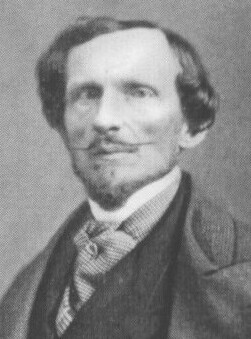
Bettino Ricasoli, 1st Count of Brolio, 2nd Baron Ricasoli was an Italian statesman. He was a central figure in the politics of Italy during and after the unification of Italy. He led the Moderate Party.
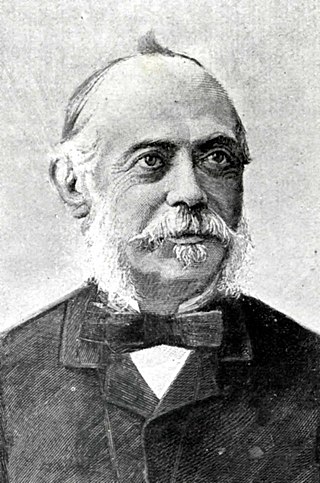
Count Stefano Jacini was an Italian statesman and economist.

Agostino Depretis was an Italian statesman and politician. He served as Prime Minister of Italy for several stretches between 1876 and 1887, and was leader of the Historical Left parliamentary group for more than a decade. He is the fourth-longest serving Prime Minister in Italian history, after Benito Mussolini, Giovanni Giolitti and Silvio Berlusconi, and at the time of his death he was the longest-served. Depretis is widely considered one of the most powerful and important politicians in Italian history.
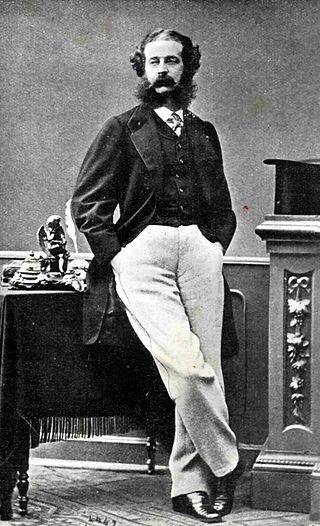
Emilio, marquis Visconti-Venosta was an Italian statesman. He is one of the longest-serving Ministers of Foreign Affairs in the history of Italy.

The Minister of Foreign Affairs is the head of the Ministry of Foreign Affairs in Italy. The office was one of the positions which Italy inherited from the Kingdom of Sardinia where it was the most ancient ministry of the government: this origin gives to the office a ceremonial primacy in the Italian cabinet.

The Third Italian War of Independence was a war between the Kingdom of Italy and the Austrian Empire fought between June and August 1866. The conflict paralleled the Austro-Prussian War and resulted in Austria conceding the region of Venetia to France, which were later annexed by Italy after a plebiscite. Italy's acquisition of this wealthy and populous territory represented a major step in the Unification of Italy.
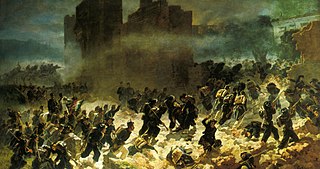
The Capture of Rome on 20 September 1870 was the final event of the unification of Italy (Risorgimento), marking both the final defeat of the Papal States under Pope Pius IX and the unification of the Italian Peninsula under the Kingdom of Italy.
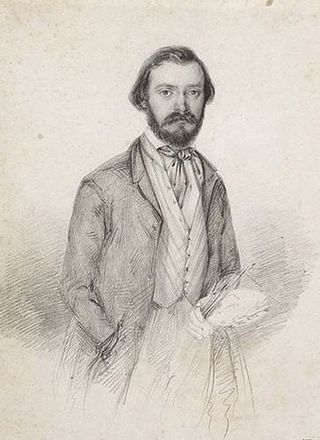
Domenico Induno was an Italian painter, primarily of genre and historical scenes. His younger brother, Gerolamo, also became a well-known artist and they often worked together.

Francesco de Martino was an Italian jurist, politician, lifetime senator (1991–2002) and former Vice President of the Council of Ministers. He was considered by many to be the conscience of the Italian Socialist Party.

The history of Chianti dates back to at least the 13th century with the earliest incarnations of Chianti as a white wine. Today this Tuscan wine is one of Italy's most well known and recognizable wines. In the Middle Ages, the villages of Gaiole, Castellina and Radda located near Florence formed as a Lega del Chianti creating an area that would become the spiritual and historical "heart" of the Chianti region and today is located within the Chianti Classico Denominazione di Origine Controllata e Garantita (DOCG). As the wines of Chianti grew in popularity other villages in Tuscany wanted their lands to be called Chianti. The boundaries of the region have seen many expansions and sub-divisions over the centuries. The variable terroir of these different macroclimates contributed to diverging range of quality on the market and by the late 20th century consumer perception of Chianti was often associated with basic mass-market Chianti sold in a squat bottle enclosed in a straw basket, called fiasco.

The Legislature IX of Italy was the 9th legislature of the Italian Republic, and lasted from 12 July 1983 until 1 July 1987. Its composition was the one resulting from the general election of 26 and 27 June 1983. The election was called by President Sandro Pertini one year before the previous legislature's natural end on 5 May 1983, after a crisis in the incumbent government majority (Pentapartito).
General elections were held in Italy on 10 March 1867, with a second round on 17 March. Before the elections, Bettino Ricasoli resigned as Prime Minister due to a disagreement with the Chamber; the Chamber disapproved of his agreements with the Vatican regarding the repatriation of certain religious properties. These snap elections resulted in Urbano Rattazzi being elected once again to office.
The Right group, later called Historical Right by historians to distinguish it from the right-wing groups of the 20th century, was an Italian conservative parliamentary group during the second half of the 19th century. After 1876, the Historical Right constituted the Constitutional opposition toward the left governments. It originated in the convergence of the most liberal faction of the moderate right and the moderate wing of the democratic left. The party included men from heterogeneous cultural, class, and ideological backgrounds, ranging from Anglo-Saxon individualist liberalism to Neo-Hegelian liberalism as well as liberal-conservatives, from strict secularists to more religiously-oriented reformists. Few prime ministers after 1852 were party men; instead they accepted support where they could find it, and even the governments of the Historical Right during the 1860s included leftists in some capacity.

The Ricasoli I government of Italy held office from 12 June 1861 until 3 March 1862, a total of 264 days, or 8 months and 19 days.

The Rattazzi I government of Italy held office from 3 March 1862 until 8 December 1862, a total of 280 days, or 9 months and 5 days.

Ignazio De Genova di Pettinengo was an Italian politician and general. He was Minister of War during the Third Italian War of Independence.
